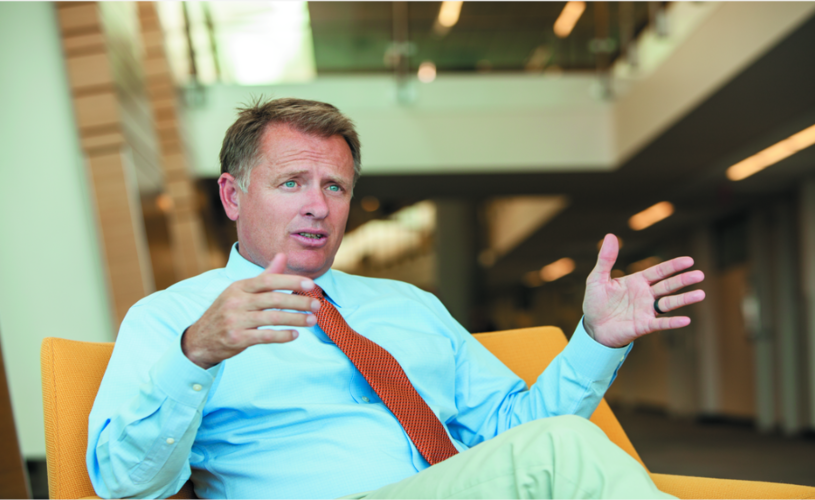at the University of Utah
Q&A: The University Venture Fund, with Eccles School Dean Taylor Randall
The Sorenson Impact Center recently announced the successful first-round close of University Venture Fund — Impact Investing, or UVF II, an $8.2 million fund that follows on the heels of the original University Venture Fund. With that in mind, we sat down with Dean Taylor Randall of the David Eccles School of Business to look back on the first fund, and the role of impact investing in the school’s future.
Q: University Venture Fund, or UVF, was the largest fund of its kind in the United States. Where did the idea come from, and how did it change the education landscape?
A: The idea for UVF originally came from alumni, specifically Jim Sorenson and Jeff Wooley, and students. I was privileged to be involved early on as a faculty member. Jeff and Jim felt there was a huge opportunity to teach our students hands-on, real-world financial skills through private equity and venture capital. This hadn’t previously been part of our curriculum, but as the venture world matured this type of learning became very appealing to our students. We wanted to add a differentiating factor to the Eccles School experience, and felt starting our own fund was a great way to do that. At the time Cornell, Michigan and Utah were the only student funds in the country, and we were the largest.
Q: The Eccles School puts a high value on experiential learning. What do you feel students gain from adding these experiences to what they learn in the classroom?
A: I see two huge advantages to experiential learning. The first is that the real world moves at a much faster pace than the classroom. We try to simulate that through our experiential learning. For example, work isn’t performed at an even pace across the semester. Instead it is deadline driven.
The real world also tends to be much messier than what we’d normally see in a classroom setting. Our students are going to be dealing with imperfect data, uncertain information and decision makers with very different tastes when they start their careers. That just can’t be replicated in a textbook, or even a case study. We feel like giving students a real-world application of knowledge will help them be more prepared when they enter the job market.
Q: UVF II seeks to invest in companies that “do well while doing good.” How do you see that philosophy shaping business education today?
A: We’re seeing an increasing trend where our students not only care about finding a job after graduation, they want to find meaning in their work. They want to work for companies that not only reap profits, but also have well-identified ways that they are impacting the world. Some of these may be through social issues, others might be through new ideas that change the way we do things. That meaning can come in many different ways for students, whether they work at a non-profit or for-profit company.
Q: Utah has a strong culture of charitable giving and philanthropy. How do you think impact investing like UVF II compliments that?
A: The venture-fund model really adds another tool to the philanthropic tool kit. Instead of just giving grants, you can have a different effect by actually making an investment. Doing so can actually change the governance and incentive structure at the company in a positive and powerful way. This type of investment also allows the company to scale more readily in the market.
Q: How is the Eccles School preparing students to become the next generation of impact pioneers?
A: The Sorenson Impact Center offers an absolutely incredible opportunity for our students to be involved with impact investing in a meaningful way. It allows our students to experience a variety of roles such as policy making, financial investment, idea generation, entrepreneurship and communications.
I think you’ll see these types of opportunities playing an even bigger role for students in the future. I hope to see more curriculum in this area, and even potential certificates and degrees with an emphasis in impact investing. We are taking a bet on the future. To use a hockey analogy, we are skating to where the puck is going. We’re ahead of many schools in terms of the sophistication of our impact investing program, and we want to stay ahead of the curve.
Q: Jim Sorenson has been a pioneer of impact investing. How do you hope Eccles School students carry on his legacy?
A: Jim is so involved in this effort and is passing his legacy directly to our students. They actually get the opportunity to witness firsthand and understand how he makes impact decisions — and he’s one of the best at it. I expect to see his style of investment carried forward, along with his philosophy and passion for the field.





